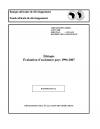Evaluation Team
This report was prepared by Mr. F. TURAY, Principal Evaluation Officer, Operations Evaluation Department
(OPEV), and Mr. H. K. TAYE, Consultant (Macroeconomist). Mr. K. SARHANE, Research Assistant, OPEV,
provided the statistical support.
Objective
This report seeks to assess the relevance, achievement of objectives, and contribution of the Bank’s assistance program to national development outcomes. It also draws lessons and recommendations to help inform the ongoing and future AfDB assistance to the country.
Main Findings
- The evaluation found the Bank assistance strategy to be relevant. But the delivery of the assistance program was weak and highly inefficient: consequently the development results were limited. The Bank improved its performance over the review period but overall it was unsatisfactory.
- The case of Ethiopia illustrates problems faced more widely by the Bank’s operations teams. Implementation has often been hampered by inflexibility in procedures and delays both on the part of the Bank and the recipient. But lessons have been learned and the Bank’s ongoing reforms are intended to remove blockages, speed implementation and raise performance.
- Decentralization of Bank personnel backed by greater delegation of authority should help to address many of the problems detailed in the present report. Indeed, following further strengthening of the Bank’s Field Office in Ethiopia, it appears that programme management is improving. The evidence presented in this report of the Bank’s unsatisfactory performance in past years should spur faster and deeper reforms going forward. And to the extent that the report provides evidence of shortcomings in implementation on the side of Government, the Ethiopian authorities may likewise wish to consider ways and means of strengthening performance.
Main Recommendations
Recommendations to the Bank:
- Improve performance of the active portfolio to achieve development results on the ground: The Bank’s 1996-2004 assistance was chronically slow in disbursement, thus limiting its contribution to national development results and undermining country ownership. This was a generic problem across sectors but more severe in education, health, technical assistance, and agriculture. The Bank, together with the GoE, should seek to achieve a better delivery rate through (i) enhanced and timely disbursement of TA to improve management capacity and facilitate compliance with conditionalities; (ii) appropriate Bank procurement and disbursement rules and procedures; (iii) effective and appropriate supervision and dialogue, backed by knowledge generation through relevant ESW. The success of future assistance will also depend upon the realism and quality of project and program design.
- Improve the effectiveness of EFTO: The Bank should deepen the ongoing process of empowering its field office. This could greatly improve the Bank’s effectiveness in partnerships, aid coordination, policy dialogue, and in project/program design and implementation. This should translate into an effective, efficient, and accountable ETFO with enhanced portfolio management decision-making authority and appropriate HQ support.
- Improve the results orientation of Bank processes, projects, and programs: The Bank should improve its RB-M&E by (i) ensuring that its projects, programs, and implementation processes are RB-M&E compliant, and that the M&E systems are realistic and generate appropriate Data; (ii) clearing the backlog of outstanding PCRs; (iii) continuing to support Government efforts to build its federal and regional M&E capacity.
- Widen and deepen ESW development knowledge: While continuing to carry out feasibility studies for project/program formulation, the Bank should also undertake more indepth ESWs on pertinent development issues. This will underpin its policy dialogue, aid coordination and investment choices, as well as scaling up the replicability of successful project results.
- Enhance selectivity in lending and nonlending programs: The limited selectivity of Bank strategy undermined the delivery of Bank assistance, and the effectiveness of Government and Bank implementation. The Bank needs to be selective in both lending and nonlending activities because it cannot afford to engage, on a sustainable basis, in too many sectors. In practicing selectivity, the Bank should take into account (i) its sector comparative advantage; (ii) the Government’s and other development partners’ expectations of the Bank; (iii) its importance relative to other development partners in specific sectors.
Recommendations to the Beneficiary:
- Strengthen in-country implementation capacity and stakeholder participation: The GoE should continue its efforts to build human and institutional capacity, and to broaden and deepening stakeholder participation at all administrative levels. And the Bank should support such Government efforts, as this will improve the portfolio results.
File(s):
| Attachment | Size |
|---|---|
| 606.94 KB |


